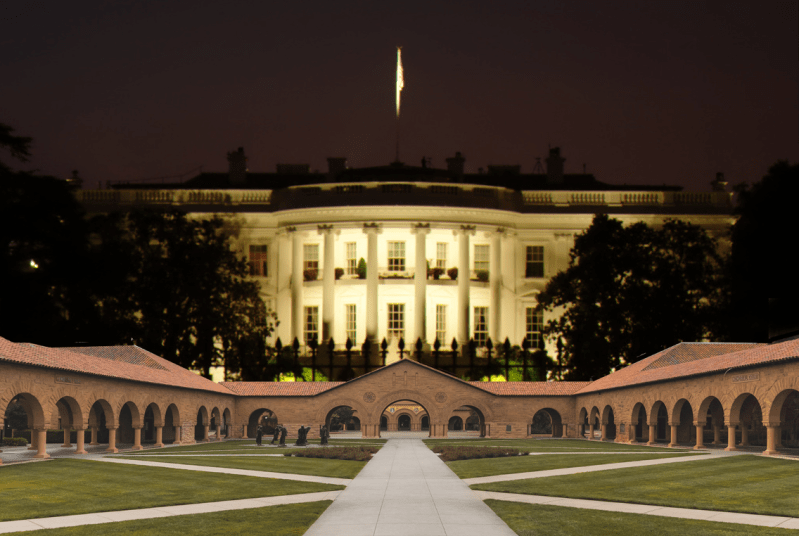The Stanford community is anxiously awaiting the results of the presidential election, which has yet to be called as of early Wednesday morning.
Campus support for former Vice President Joe Biden started out lukewarm, with many students preferring other contenders for the Democratic nomination. In February, Stanford’s Iowa satellite caucus sent delegates to the county-level caucuses for Sens. Bernie Sanders (D-Vt.), Elizabeth Warren (D-Mass.) and Amy Klobuchar (D-Minn.) in the primary election.
While campus enthusiasm seemed to focus on progressive candidates such as Sanders and Warren, in the wake of Sanders’ primary loss, Democratic support was funneled into Cardinal for Biden, led by former Cardinal for Warren lead Chloe Stoddard ’21.
All three Stanford alums who sought the Democratic nomination — Sen. Cory Booker ’91 M.A. ’92 (D-N.J.), former Secretary of Housing and Urban Development Julián Castro ’96 and Tom Steyer MBA ’83 — dropped out in the spring.
President Trump’s 2016 election was met with anger, fear and anxiety on Stanford’s campus. Over 400 students gathered in White Plaza after 10 p.m. on election night to hold an anti-Trump rally, taking turns with a megaphone to share their fears about Trump’s policies, xenophobia and bigotry.
Stanford affiliates and the Trump administration have repeatedly clashed since then. Most recently, Stanford submitted comments opposing a proposed immigration policy that no longer commits to allowing international students to stay in the country for the duration of their studies.
Pandemic policy has also taken center stage in the rift between Trump and the campus. While the Trump administration assured the public in February that the coronavirus was under control, members of the Hoover Institution’s Board of Overseers were reportedly warned by senior administration officials that they were concerned about how the virus would affect the economy.
Trump has embraced Hoover Institution senior fellow Scott Atlas and his controversial views on the virus. Anthony Fauci told the Washington Post that Atlas is the only “medical person” who sees the president regularly. Around 100 Stanford faculty condemned Atlas’ positions in an open letter to the Stanford University School of Medicine faculty.
Stanford affiliates have also offered their expertise in an unprecedented election year. This year’s election brought a record number of vote-by-mail ballots, many of which have not yet been counted. Biden and Trump offered competing outlooks on when the election would be officially called.
“We knew this was going to go long,” Biden said on Tuesday night, adding that he anticipated the race would drag into Wednesday. “We feel good about where we are. We really do.”
In contrast, Trump told supporters that, “as far as I’m concerned, we already have won it,” a declaration many criticized as premature.
Stanford affiliates have urged patience on social media and on television: “This is a 100-year flood of voters that we are seeing, and while there’s always reasons to be concerned and vigilant, we shouldn’t look at Election Day and see isolated instances of problems and assume that that is the story,” Stanford law professor and Healthy Elections project co-founder Nate Persily said on Meet the Press on Monday. “So while, you know, we who work in this field are always concerned about these types of dysfunction, there is no indication now, at least in the early voting, that it’s posing a big problem.”
Discussing concerns about some vote-by-mail ballots not being counted, Stanford experts told students in late September that they should vote early and track their ballots, because “voting by mail is not without risks,” at an event hosted by Stanford in Government, Stanford Votes and the Stanford-MIT Healthy Elections Project.
Like many, several Stanford students voted by mail, with varying degrees of difficulty. Cardinal for Biden co-director of communications and design Kaylie Mings ’21 told The Daily voting had been “pretty easy” in Texas. But Senate Chair Micheal Brown ’22 said he had a harder time voting this year, adding that though he was able to vote by mail in Texas for the general election, he was not able to vote in Texas for the primaries due to difficulties with vote-by-mail, and was forced to vote in California.
StanfordVotes co-director Sean Casey ’22 voted in person on Election Day in Indiana.
“The lines were like, you know, insane, like actually crazy,” he said in an interview. He added that most people followed COVID-19 public health guidelines, such as wearing masks and using hand sanitizer.
StanfordVotes is a non-partisan student-led organization which aims to increase voter turnout among Stanford students. Formed after low student turnout rates in 2014 and 2016, StanfordVotes partnered with the University to implement an enrollment hold, encouraging students to register to vote before they are allowed to sign up for classes.
Casey said that he was “so excited” for the Stanford community following StanfordVotes’ registration campaign.
“We’ve seen such an outpouring of people who are really civically engaged,” he said. “I think we’ve had just a lot of support this year, and I’m really excited to see how we end up doing in terms of turnout numbers and participation numbers,” because “there’s a lot of energy and excitement around this election.”
Students spent Election Day in a variety of ways, from watching newscasts with family to heading to bed.
Brown said that he was “trying to stay away from too much media” because he wanted to “have peace in terms of processing the election in the way that I see fit.”
Stanford Libertarians President Jason Spyres ’21 urged students feeling anxious to “actually start doing something that’s going to better their lives, and better the lives of a person that they care about.”
“Don’t depend upon presidential elections to be the outcome of the America that you want to have, because the minute that we depend on who our leader is for our country to be great, we’ve already lost the spirit of what this country is about,” he said.
Contact Emma Talley at emmat332 ‘at’ stanford.edu.
